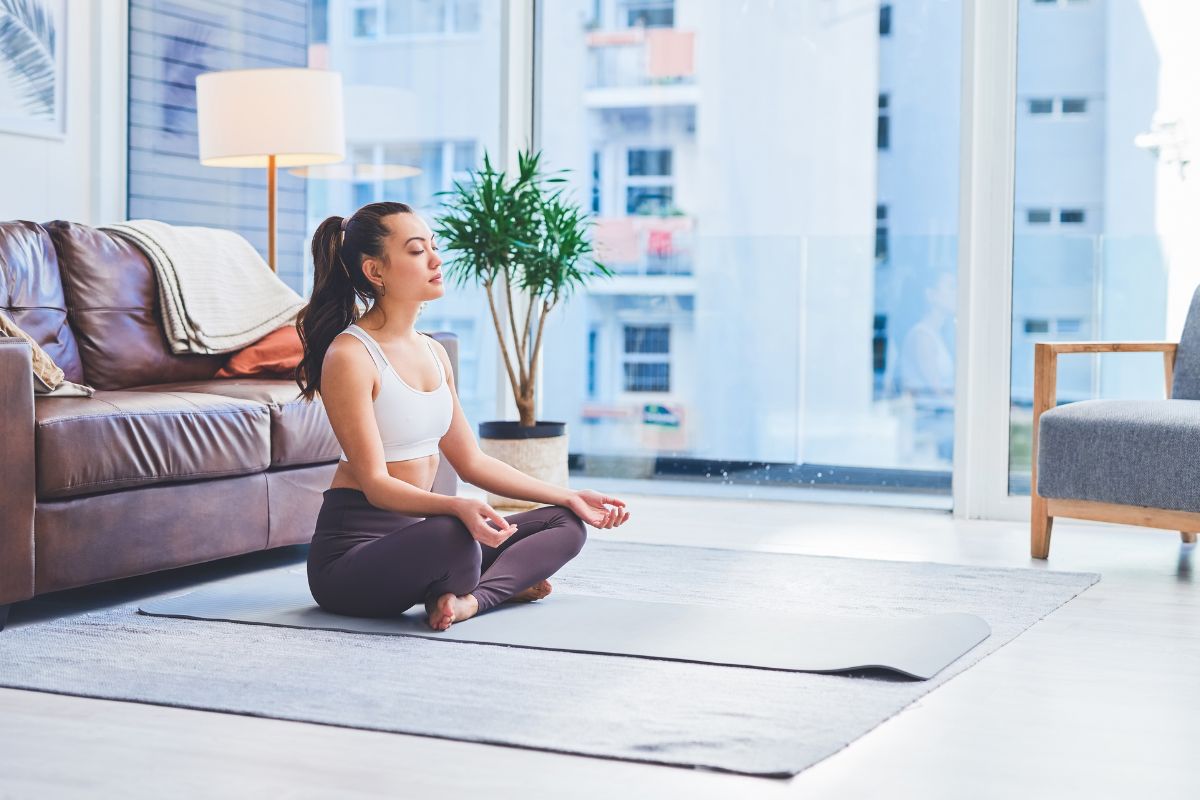How to Maintain Good Health Naturally at Home

Living a healthy life doesn’t require expensive supplements or a gym membership. You can build strong habits at home with simple, natural strategies. Focus on whole, unprocessed foods, regular movement, stress management, good sleep habits, and a nurturing environment. Below are detailed tips for each area, backed by reputable health sources.
Natural, Balanced Nutrition at Home
Eating a variety of whole foods is key. Fill your plate with colorful fruits and vegetables, which are rich in vitamins, minerals and fiber. Add lean proteins (such as poultry, fish, eggs, or beans) and healthy fats (olive oil, nuts, avocado). Include whole grains (brown rice, oats, quinoa) rather than refined grains. As one expert review notes, “eating various nutritious foods – fruit, vegetables, nuts, seeds, and lean protein – can support your overall health”. Limit processed snacks, excessive sugar, salt, and fried foods.
-
Eat the rainbow. Choose vegetables and fruits of different colors each day to get a range of nutrients (vitamins A, C, K, potassium, etc.). For example, spinach, carrots, broccoli, and bell peppers are nutrient-dense choices.
-
Use common kitchen staples. Things like eggs, legumes, yogurt, whole fruits, and vegetables are affordable and nutritious. Prepare simple meals: oatmeal with nuts and fruit, stir-fries with mixed veggies and tofu, or lentil soup with carrots and herbs.
-
Stay hydrated. Drink plenty of water throughout the day. Limit sugary drinks and excessive caffeine. Water aids digestion and overall health.
-
Mind your portions. Balance your plate: about half vegetables/fruit, a quarter lean protein, a quarter whole grains. Eating regularly (3 meals + healthy snacks) helps maintain energy.
By focusing on unprocessed, nutrient-rich ingredients in home cooking, you can meet most vitamin/mineral needs naturally. Aim for moderation and variety rather than strict dieting. Small changes like adding a side salad to meals or choosing whole-grain bread over white can make a big difference over time.
Simple At-Home Exercise Routines
You don’t need a gym to stay fit. Home workouts can be effective for all levels by using your own body weight and small weights (or household items) as resistance. Studies show that focused bodyweight workouts can build muscle and boost metabolism as effectively as gym sessions when done consistently.
-
Beginner routine: Start with basic moves. Examples: squats, chair squats, lunges, push-ups (or knee push-ups), planks, wall-sits, and gentle yoga stretches. For instance, doing 2–3 sets of 10–15 squats and push-ups 3 times a week can improve strength. Many “at-home workouts that focus on bodyweight exercises are an effective way to help build strength and muscle mass”.
-
Intermediate/advanced: As you get stronger, add variety or extra reps. Try jumping jacks, burpees, mountain climbers, or step-ups. You can also use filled water bottles or a backpack as light weights. Incorporate circuit training (several exercises back-to-back with short rest) or short HIIT (high-intensity interval training) sessions (e.g. 20 seconds hard effort, 10 seconds rest).
-
Flexibility and balance: Don’t forget stretching or yoga moves like downward dog, forward fold, cat-cow, or child’s pose to keep muscles supple. Even gentle stretching after a workout aids recovery.
-
Daily movement: Aim for at least 30 minutes of moderate activity most days (brisk walking, dancing, gardening, etc.). If 30 minutes at once is hard, break it into 10–15 minute bursts. Every bit helps!
-
Consistency and progression: Start slow if needed, then gradually increase intensity or duration. Even 10–15 minutes of exercise daily is beneficial. The key is regularity. Over time, you’ll see gains in strength and stamina.
By staying active at home, you boost cardiovascular fitness, build muscle, and support weight management. Choose activities you enjoy (music on, workout videos, or family exercises) to keep motivation high. Regular exercise also aids sleep and mood. As noted in fitness research, even home-based workouts “can be as effective as a gym workout if done correctly and consistently.
Mental Wellness Practices
Maintaining mental health is as important as physical health. Daily practices like meditation, journaling, and controlled breathing can reduce stress, improve mood, and increase focus.
-
Meditation and mindfulness: Just a few minutes of meditation (even 5–10 minutes) can create calm. Mayo Clinic explains that meditation helps you focus on the present and “wipe away the day’s stress, bringing inner peace”. Regular meditation can lower blood pressure, slow heart rate, and help you feel centered. To start: find a quiet spot, sit comfortably, and focus on your breath or a word/mantra. If thoughts wander, gently return to your breath.
-
Deep breathing exercises: Practice slow, deep breathing to activate the body’s relaxation response. For example, cyclic sighing (inhale through the nose, then take a second deep “sip” of air, and exhale slowly) for just five minutes daily has been shown to “reduce overall anxiety and improve mood”. Long exhales trigger the parasympathetic nervous system, lowering stress hormones. Try 4-7-8 breathing (inhale 4 sec, hold 7 sec, exhale 8 sec) or simply count breaths.
-
Journaling or expressive writing: Writing down your thoughts and feelings can be very therapeutic. Research (Harvard Health) indicates that “writing about thoughts and feelings that arise from a traumatic or stressful life experience” helps people cope better with stress. In practice, spend 5–10 minutes daily (or at least weekly) jotting in a journal: note what you’re grateful for, what worries you, or simply record your day. This can organize your thoughts, reduce anxiety, and improve self-awareness.
-
Other relaxation habits: Incorporate soothing activities like listening to calming music, reading, gentle yoga, or a warm bath. Even short breaks to step outside or enjoy nature can lift your mood. Try a daily routine of unplugging (phones off) before bed to unwind.
Incorporating these practices helps counteract stress from work or life. Over time, regular meditation and breathing reduce baseline anxiety levels, and journaling can give you perspective. These tools are low-cost, easy to start, and well-supported by health experts.
Tips for Improving Sleep Naturally
Quality sleep is crucial for health. Good sleep hygiene and habits can help you fall asleep faster and sleep more soundly without needing medication.
-
Consistent sleep schedule: Go to bed and wake up at the same times every day, even on weekends. Aim for 7–8 hours of sleep (most adults need at least 7 hours). A regular routine reinforces your body’s natural sleep-wake cycle. If you can’t sleep after ~20 minutes, leave the bedroom and do something relaxing (read, listen to soft music), then return when sleepy.
-
Restful sleep environment: Make your bedroom cool, dark, and quiet.. Bock out lights (or use an eye mask), use earplugs or a fan if noise is an issue, and keep the temperature comfortable. Remove electronic devices. Bright light from phones or TVs signals your brain to stay awake. Reserve the bedroom for sleep (and intimacy) only; avoid working or watching movies in bed.
-
Evening routines: Avoid heavy meals, caffeine, and nicotine in the hours before bed. A large or spicy dinner can cause discomfort; caffeine and nicotine are stimulants that can keep you awake. While alcohol might make you drowsy initially, it disrupts sleep later. Instead, have a light snack if hungry (e.g. a banana or yogurt) and herbal tea (like chamomile) before bed.
-
Daytime activity: Regular exercise promotes better sleep. Aim for moderate activity earlier in the day (morning or afternoon). However, avoid vigorous workouts right before bedtime, as they can energize you. Natural daylight exposure (especially in the morning) also strengthens your sleep signals, so try to get outside or let sun into your home during the day.
-
Manage stress before bed: Spend a few minutes winding down. Techniques like meditation or reading something calming can ease you into sleep. One Mayo Clinic tip is to “try to resolve your worries or concerns before bedtime” by writing them down and setting them aside. This might mean jotting tomorrow’s to-do list or doing a brief relaxation exercise in bed.
By combining these habits, you set the stage for natural, restorative sleep. Remember that occasional sleeplessness happens, but chronic insomnia should be addressed with a doctor. For everyday practice, focus on consistency, comfort, and relaxation.
Traditional Home Remedies and Natural Supplements
For common minor issues (like colds, headaches, mild aches, indigestion, or sleeplessness), certain natural remedies and foods can help soothe symptoms. These are not substitutes for medical care when needed, but many have long histories and some scientific support:
-
Ginger: A cup of ginger tea (fresh or dried ginger in hot water) can calm nausea (from upset stomach or even travel sickness) and soothe throat irritation. Ginger also has anti-inflammatory effects. Health experts note it’s “almost law to try ginger” for a cold, sore throat, or nausea. It may help ease minor headache or muscle aches with its pain-relieving compounds.
-
Turmeric (with black pepper): Turmeric’s active ingredient curcumin has strong anti-inflammatory properties. Studies find that curcumin can relieve arthritis pain and inflammation as effectively as some drugs. Try adding turmeric to curries, soups, or golden milk (warm milk with turmeric and a pinch of black pepper to boost absorption). For some conditions, higher-dose curcumin supplements are used, but culinary use can contribute to long-term joint health.
-
Honey (and lemon): For soothing a cough or sore throat, warm water or tea with a spoonful of honey (and a squeeze of lemon) can be calming. Research shows honey significantly “lessen[s] coughing” in people with colds and helps them sleep better. (Use honey only for adults and children over 1 year old.)
-
Peppermint: Peppermint tea is a gentle digestive aid. It can relax stomach muscles and ease indigestion or gas. Some sources also note mild headache relief from peppermint’s menthol. Peppermint is soothing and caffeine-free – sip a cup after meals or when you feel tension.
-
Chamomile: A cup of chamomile tea before bed acts as a mild tranquillizer. Chamomile contains compounds (like apigenin) that bind brain receptors and may help you relax. A meta-analysis found chamomile improved sleep quality, and it has been traditionally used to ease insomnia and anxietys.
-
Other herbs: Lavender (as tea or aromatherapy) can reduce stress and headache; mint (spearmint/peppermint) can freshen breath and settle the stomach; Echinacea or elderberry (as tea/supplements) are commonly taken at the first sign of a cold (some evidence suggests they may modestly boost immunity). Even simple foods like garlic (antimicrobial properties) or yogurt (probiotics for gut health) can play a role.
Preparation and caution: Most home remedies are safe when used moderately. For example, a DIY ginger-turmeric tea or honey-cinnamon mix can be comforting. Always use clean, food-grade herbs and start with small doses to test for allergies (e.g. ginger or mint can trigger heartburn in some). Remember natural supplements can interact with medications, so check with a healthcare provider if in doubt.
Overall, the best natural remedies are preventive – a healthy diet, good sleep, and hydration reduce the need for “remedies” in the first place. But having these simple options (like herbal teas, mild spices, or home concoctions) on hand can relieve minor complaints naturally when they arise.
Creating a Healthy Home Environment
Your surroundings influence well-being. A clean, bright, and well-ventilated home can reduce stress and support health. Here are practical tips:
Declutter and organize. A tidy space promotes calm. Research shows clutter can increase stress and make it hard to focus. Set aside a few minutes each day to put things away, and periodically clear out unused items. Even simple acts (like making the bed, wiping surfaces) can give a sense of control and reduce anxiety. Organized shelves and storage make daily life smoother.
-
Natural light: Open curtains and blinds by day. Exposure to morning sunlight helps set your body’s internal clock, boosting mood and energy. Bright, natural light can improve sleep-wake cycles and productivity. If privacy is a concern, use sheer curtains to let light in.
-
Air quality: Good ventilation is key. Open windows daily (weather permitting) to let fresh air in. Indoor air purifiers or fans can also improve airflow. Plants help, too: having a few houseplants not only adds oxygen but is linked to lower stress and higher focus. (NASA studies suggest plants can remove some indoor pollutants, though many plants are needed for big effects.) At minimum, choosing pet-safe, non-toxic plants (like spider plants, pothos, snake plants) and caring for them can make your space greener and more soothing.
-
Soothing colors and textures: Decorate with soft colors (blues, greens) and add comforting items (blankets, pillows, favorite photos). A bit of hygge (cozy lighting, candles, soft fabrics) can make your home feel peaceful. In Mental Health America’s guidance, even arranging furniture for good flow and using simple decor can help “reduce signs of anxiety and depression”.
-
Bedroom environment: Make the sleep space serene. Use black-out shades or an eye mask to block stray light. Keep electronics (phones, TVs) out of the bedroom when possible – remember, the bedroom is for sleep and rest. A cool room (about 65–68°F or 18–20°C) is ideal for most people.
By paying attention to your home’s air, light, and tidiness, you create a supportive backdrop for health. As experts note, “Sharing your living space with living, ‘breathing’ plant life can make your environment a happier, healthier place to be,” and better indoor air and orderliness help you think and feel more clearly.
Bottom line: Small changes add up. Eating nutritious meals made from everyday ingredients, moving regularly, calming the mind, sleeping soundly, using gentle home remedies, and keeping your home clean and bright – these all work together to keep you healthy without medicines. These habits are practical for any adult looking to improve wellness naturally at home.






